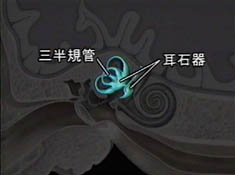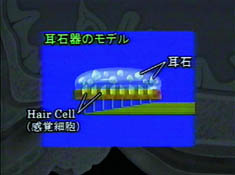<Outline of Experiment>
The purposes of this research are to study the effects of microgravity
on the response dynamics of the afferents of the otolithe organs and to
study any activation and action of the efferent vestibular system related
to the microgravity environment.
The otolith organs in the inner ear sense linear acceleration of the head
and function as a gravity sensor. Neural signals from the otolith organs
play essential roles in maintaining balance and posture. This function
is known to be common for all species from fish to higher mammals. The
responses of otolithic afferents in microgravity may be quite different
from that on the ground, and this difference may disturb the brain. This
is considered to be one of the causes for space motion sickness. But if
the period of stay in space becomes long, it is hypothesized that the efferent
system which modifies the afferent signals would work so as to restore
the otolithic function.
An aquatic animal, the toadfish, will be used for this experiment. The
activity of otolithic afferents will be chronically monitored using specially
designed electrodes to characterize their responses in normal and microgravity.
The effects of reduced gravity upon the preformance of the otolithic organs
and the action of the efferent system will be analyzed in detail.
<Expected results>
Results of the experiment will add information about the etiologies of
space adaptation syndrome and may bear upon future therapies and mechanisms
for the control of equilibrium disfunctions such as earth bound motion
sickness.
 |
 |
 |
| Semi-circular canals and otolith |
Structure of otolith organs |
|
Last Updated : March 27, 1998



